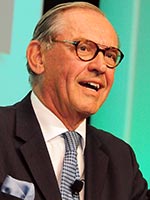
An interview with Jan Eliasson, deputy secretary general of the United Nations
In 1992 Swedish diplomat Jan Eliasson was appointed the first UN undersecretary-general for humanitarian affairs. He was elected president of the United Nations General Assembly in June 2005. In December 2006, then UN Secretary-General Kofi Annan appointed Eliasson as a UN special envoy to Darfur, Sudan. Eliasson was a plenary speaker at NAFSA’s 2012 Annual Conference & Expo in Houston, Texas. He began his new role as deputy secretary general of the United Nations in July 2012.
International Educator: How did your experience as a foreign exchange student in the United States influence your career?
Eliasson: I was part of an American family and built friendships with American students as well as other international students. Our bus tour around the States was a “mini UN” experience. The idea—later the conviction—grew inside me that I would work with international affairs the rest of my life.
IE: As the first UN under-secretary-general for humanitarian affairs in the early 1990s, you were involved in operations in Somalia, Sudan, Mozambique, and the Balkans. What was your role in initiatives on issues such as land mines, conflict prevention, and humanitarian action?
Eliasson: The humanitarian mandate for the UN was established in December 1991 after a long and arduous negotiation in the UN General Assembly. The horrible disaster in Somalia was one of my first challenges, as well as civil wars in the Balkans and other parts of Africa. The plague of land mines was a shocking experience for me, leading to initiatives to limit their use and human consequences. Prevention was always—and still is—a passionate interest of mine. I cannot understand why nations and people so often act only after the disaster. We could save so many lives, so much suffering, money, and night sleep if we were to act on the first signs of situations going wrong instead of waiting and delaying action.
IE: As a member of the advisory board on the Alliance for Peacebuilding, what is your opinion about including peace studies in university curricula or providing students the opportunity to gain exposure to peace studies through specialized study abroad programs?
Eliasson: I would widen this to a need for studies in international affairs and global trends, generally. I would also like to remind of the benefits of language studies, and of effective—and affordable—exchange programs. In a globalized world, we need to enlarge networks among younger people. Personal friendships and meetings across borders are our best peace-keeping instruments.
IE: As of July 2012 you became be the fourth deputy secretary general of the United Nations. What do you hope to achieve in this role?
Eliasson: It is a tough and challenging appointment. The world is facing serious political, economic, and environmental pressures. Multilateral action sometimes does not come easily—even if we should realize that good international solutions are in our national interest. I will work with issues related to war and peace as well as to development and building bridges to actors both inside and outside the UN.
Nobody can do everything, but everybody can do something.
